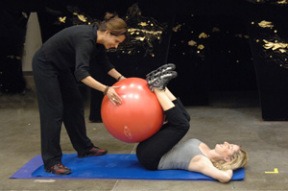Trainers from a Winslow gym put new life into Wagner’s ‘Ring.’
Vocal coaches they are not, but Alexa Rosenthal and Travis Adena of Island Fitness pumped up a trio of sopranos to sing and “swim†while suspended 25 feet above stage.
Rosenthal, Island Fitness co-owner, and Adena were hired by the Seattle Opera to help singers increase their strength, endurance and flexibility for an upcoming production.
The singers worked the back, abdomen and leg muscles, gaining the ability to keep a good posture, said Adena, personal training director at the Winslow fitness center.
“Because up in the air,†he said, “there’s not a lot to hold on to.â€
Even without the flying, Richard Wagner’s four-opera “Ring Cycle†– Der Ring des Nibelungen – is well known for taxing the voices of singers, with the longest of the four pieces running six hours.
This production will stage three cycles of the operas, running Aug. 7-28 in Seattle’s McCaw Hall.
Seattle Opera spokeswoman Rosemary Jones says it’s the equivalent of putting on a season’s worth of operas in just three months.
The Ring Cycle has its own budget of approximately $7.8 million. With 25 soloists, 75 chorus singers and the orchestra and backstage crew, nearly 300 people are involved.
“(Wagner) wrote pages of stage directions. This Ring is as close to what we could get to what Wagner visualized,†Jones said.
In the opening scene of the first opera, “Das Rheingold,†the three Rhine Daughters sing, swim, flip and somersault in the air for nearly 25 minutes.
Seattle Opera, which has made its name producing the Wagnerian oeuvre, is believed to be the only production that puts singers up in the air. In most productions, singers sit on moving sleighs or sing hidden from the stage floor while acrobats ascend on wires.
Rosenthal said Bob Schaub, the opera’s technical director, told her he decided to hire personal trainers for the upcoming performances because the singers were “wiped out†by the end of the third cycle four years ago.
Last October, the trainers met the singers and gave them exercise equipment and an in-home regime to follow until they came to Seattle to begin rehearsing in May.
Rosenthal and Adena started ferrying to Seattle Center three times a week for hour-long sessions with the singers.
Even though the harnesses are specially rigged so the singers can plant their feet “on the ground†to support their diaphragms for singing, hanging in the air creates extra stress on different parts of the body.
“In the harness, there’s a tendency to hunch your shoulders,†Rosenthal said. “It creates tension in your shoulders and you start to depend on the lower back because the rest of the body becomes weak.â€
Similar to standing on a rocking ship, Adena says, the body makes tiny, involuntary adjustments for stability and balance. Being hauled up in the air, the body needs to be stronger to find that same stability.
Rosenthal and Adena worked on “strengthening the core†– the front and back muscles of the torso – to take pressure off the lower back, as well as build up endurance and reach optimal flexibility.
With the singers at Seattle Center, the trainers didn’t have access to a full gym or even the same room each time, so they created exercises with portable equipment – stability balls, hand weights and medicine balls – to address each singer’s needs.
Aside from making allowances for how the singers needed to breathe to sing, Adena said the training approach was similar to that of working with an athlete with sports-specific goals.
On a recent afternoon, the group gathered in a large hallway working an informal circuit of exercises.
As soprano Wendy Hill rolled a stability ball up and down a wall with her back, Rosenthal checked to make sure there was no knee pain and had Hill adjust to squat more shallowly.
On days when the singers were tired from a long day of rehearsals, Rosenthal used yoga-based stretching and Pilates to increase flexibility and work on specific muscles.
“Even if you’re feeling tired, once you get your blood flowing, I always feel better,†mezzo-soprano Mary Phillips said.
Mezzo-soprano Jennifer Hines, who “never exercises,†recalls how at the start, when she “dived†in the harness it was hard to sing properly from her center.
“At first it was hard to not sing from the throat, (but) if you support down here,†she said, gesturing to her middle, “you release up here,†she said pointing to her neck.
“I feel better (now). I do hold myself a bit differently now.â€
“I’ve lost 15 to 20 pounds since October,†Hill said. “I realized I could be a big fish or a medium fish. I’m a medium fish. There’s a lot of weight on the hip bone (when in harness). I’m lighter on the feet (now) and we don’t flop (in the harness) any more.â€
Phillips is a regular jogger and tennis player. She sang in the harness for the 2000 and 2001 productions of “Das Rheingold.â€
The singers back then did some endurance training on their own, but “in 2000, I was feeling it in my lower back and neck… This has been so much better because of the (personal) training. The back is an issue when you’re flying horizontally. These exercises have been fab!â€
The trainers were equally enthusiastic.
“(The singers) are so wonderful, so positive. It’s been a real honor and I’m humbled by the experience,†Rosenthal said. “People come from all over the world to see it and we contributed a piece to let them be the best they can be up there.â€



